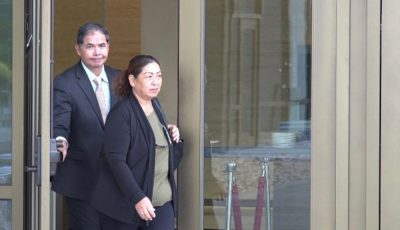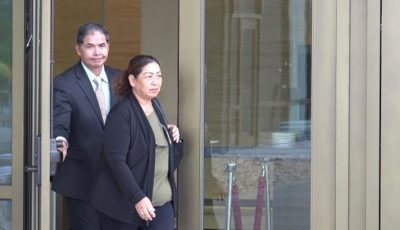Prosecution opposes Sagana’s request for findings in FBI investigation into the BMV
The U.S. government, which is suing Bonifacio Sagana in an ongoing license fraud case, is strongly opposing his request for material acquired through a previous FBI investigation into the CNMI Bureau of Motor Vehicles.
Sagana, who was arrested back in 2022 for his alleged involvement in the production of fraudulent CNMI driver’s licenses, previously asked that the U.S. District Court for the NMI to compel the government to produce material relating to the FBI’s search of the CNMI Bureau of Motor Vehicles back on Dec. 16, 2022.
Sagana, through his lawyer, Richard Miller, specifically asked that the prosecution disclose items seized during the FBI search as it is material needed to prepare Sagana’s defense for trial.
Specifically, the defense wants the prosecution to produce materials such as:
Reports, investigator notes, or records of interviews with CNMI Bureau of Motor Vehicles personnel that describe BMV’s procedure for processing driver’s license applications;
Physical forensic images of the BMV workstations used by employees during the time frame of interest to process the allegedly fraudulent immigration documents and driver’s licenses;
Physical forensic images of BMV’s server that was in operation during the time frame of interest which stored electronic records related to the allegedly fraudulent immigration documents and driver’s licenses; and
Any and all data that is not physically stored at BMV but is a part of their process for creating, storing, and maintaining records.
However, according to assistant U.S. attorney Albert S. Flores, the court should deny Sagana’s request because the request to produce these materials is a vastly overbroad attempt to access information from an investigation unrelated to the defendant as the FBI is not even a part of the prosecution team.
“Defendant is using a high-profile FBI search warrant of the BMV, executed post-indictment of the defendant, and post-scheduling of defendant’s trial, as an excuse to gain a voluminous amount of information unrelated to defendant’s case. If defendant’s request is granted, defendant will undoubtedly claim the large volume of information is grounds to delay defendant’s trial once again,” said Flores.
In addition, the prosecution argues that if the defendant’s request for digital forensic files is granted, he would have access to every CNMI resident’s personal information, which is a grave cause for concern.
“This court should be cautious because if defendant’s request for digital forensic files is granted, defendant would have unfettered access to practically every CNMI citizen’s personal identifiable information on who has applied for, who has been issued, or who has personal records at the BMV. It should be without question, this is a glaring, if not outrageous, cause for concern. The citizens of the CNMI should not need to worry that all their personal information at the BMV would be in the hands of a criminal defendant charged with production of fraudulent identification documents, just because defendant speculates that this information might somehow be helpful to his defense,” said the lawyer.



























